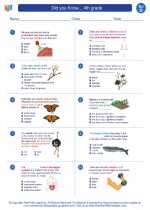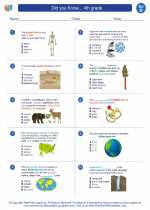Did you Know... 4th grade -> chemical energy
Chemical Energy
Chemical energy is a form of potential energy that is stored in the bonds of chemical compounds. This energy is released during a chemical reaction, such as burning fuel, digesting food, or in the process of photosynthesis in plants.
Key Concepts
- Energy Storage: Chemical energy is stored in the bonds of molecules and can be released when these bonds are broken.
- Forms of Chemical Energy: Chemical energy exists in various forms, including fossil fuels, food, batteries, and biomass.
- Conversion: Chemical energy can be converted into other forms of energy, such as thermal, mechanical, or electrical energy.
- Examples: Common examples of chemical energy include the energy stored in gasoline, the nutrients in food, and the energy released during the combustion of natural gas.
Study Guide
Here are some key points to focus on when studying chemical energy:
- Understand the concept of potential energy and how it relates to chemical bonds.
- Learn about different forms of chemical energy and their uses in everyday life.
- Explore the process of energy conversion and how chemical energy can be transformed into other types of energy.
- Study specific examples of chemical energy and the reactions that release this energy.
- Consider the environmental and societal impacts of harnessing and using chemical energy sources.
By mastering these concepts and key points, you will gain a solid understanding of chemical energy and its significance in the world around us.
[Chemical Energy] Related Worksheets and Study Guides:
.◂Science Worksheets and Study Guides Fourth Grade. Did you Know... 4th grade
Study Guide Did you Know... 4th grade
Did you Know... 4th grade  Worksheet/Answer key
Worksheet/Answer key Did you Know... 4th grade
Did you Know... 4th grade  Worksheet/Answer key
Worksheet/Answer key Did you Know... 4th grade
Did you Know... 4th grade  Worksheet/Answer key
Worksheet/Answer key Did you Know... 4th grade
Did you Know... 4th grade 

 Worksheet/Answer key
Worksheet/Answer key
 Worksheet/Answer key
Worksheet/Answer key
 Worksheet/Answer key
Worksheet/Answer key

The resources above cover the following skills:
Core Ideas for Knowing Science
Life Science
Organisms are organized on a cellular basis and have a finite life span.